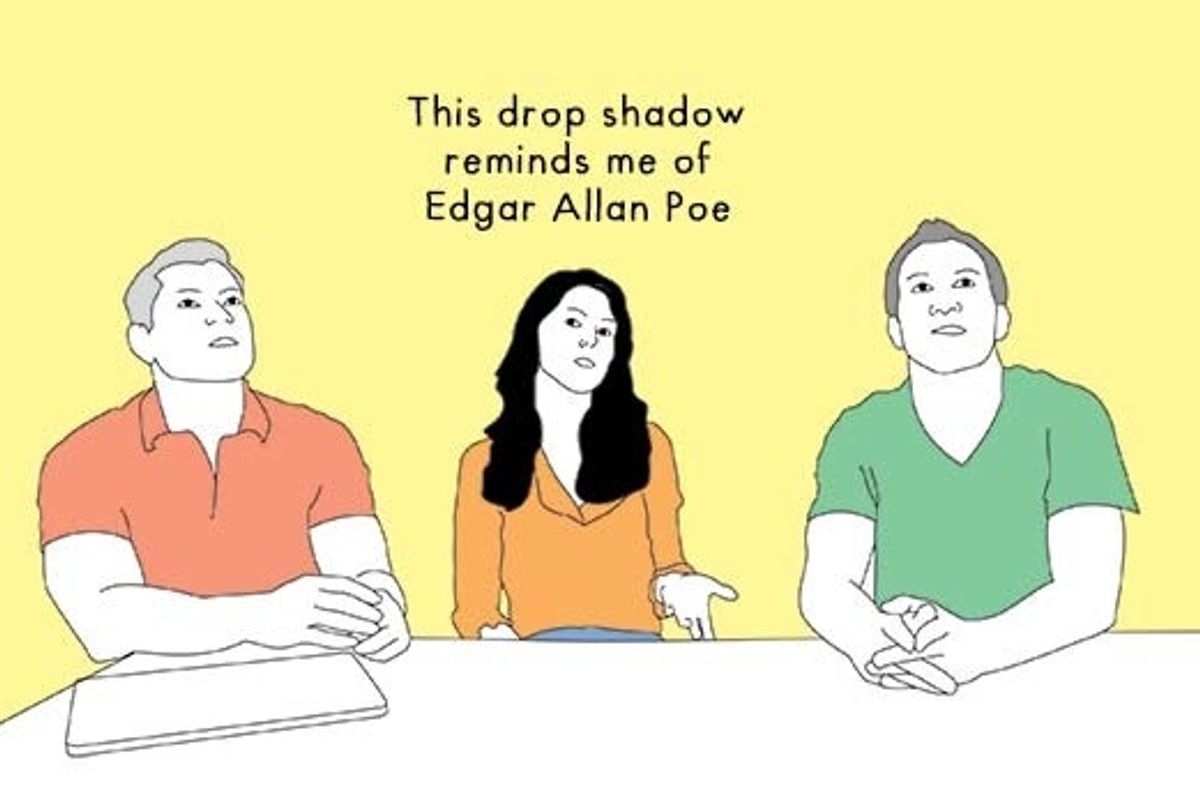You went to college for what you loved and somehow ended up in an open office plan. There are bean bag chairs and conference rooms and free beer after 5pm on Fridays and that's cool but most people don't want to talk about Joan Didion or read your manuscript.
Congratulations! You work in technology: a hot career field that you can't explain to your liberal arts pals.
Their eyes glaze over when you go on about sprint plans, or roll when you say yearly bonus. You just can't win – or can you?Behold, the top 10 ways to use your English degree in your day-to-day interactions, and in the process bring a touch of humanities to the world of code and scrum.
1. Reuse your thesis during design reviews
Design reviews are a drag, but it's nothing a little "Apparitional Economies: Spectral Imagery in the Antebellum Imagination" won't fix. Work Poe's shadowy figures into discussions of drop shadows.
2. Sprinkle poetry Easter eggs in Github
Give your software engineer an unexpected treat: a little Gwendolyn Brooks in Github. There's nothing like raw, terse urban beauty tucked admist the commits to help contemplate non-existent work-life balance.
3. Remind everyone of tech leaders with liberal arts degrees
- Salesforce: Co-Founder Parker Harris studied English at Middlebury
- Alibaba: Founder Jack Ma was an English teacher
- Snapchat: Former COO Emily White studied Fine and Studio Arts at Vanderbilt
- LinkedIn: Founder Reid Hoffman studied Philosophy at Oxford
- Slack: Founder Stewart Butterfield studied Philosophy
In The Fuzzy and the Techie, Scott Hartley says liberal arts will rule the digital world, so why not you?
4. Give The Lean Startup a close read
That inspirational business book the CEO bought everyone is ripe for analysis. Use structuralism to show that literary texts cannot be divorced from historical context, aka having money and advantage sure helps, Eric Ries.
5. Cite literary sources during standups
Programmers love to trash liberal arts degrees. Remind them that all popular media they enjoy was created by someone with your uncultivated skillset. Standup will be tense, but tension just advances the plot.
6. Make meetings magically realistic
During another 30 minutes of nothing much getting decided, mute the Polycomand channel the spirit of Italo Calvino. The account manager has the horn of a unicorn. His promises are cotton candy clouds. Pretty.
7. Find lyricism in your use of tech buzzwords
A healthy glossary is key to expressing your thoughts. Disruptive doesn't traditionally have positive connotations but you're pretty much in Brave New World so okay, a transitive verb that means to break is fine. This retrospective is disrupting your spirit.
8. Find touches of Hemingway in your CEO
See the literary canon in action. Hemingway's alcoholism and fragile femininity got nothing on Gary at a company-sponsored golf outing.
9. Explore narrative conflict in quarterly planning
Use those career misgivings to really dig into Man vs. Self (what am I doing here), Man vs. Man (is Amy really holding out on my expense reports), Man vs. Society (my publishing friends paid for their own holiday party), Man vs. Nature (yet I haven't seen the sun in three days), Man vs. Fate (but seriously what am I doing).
10. Relate #WomeninTech with the concept of the Other
As an English major, you might not be good at math, but you have eyes: get ready to get uncomfortably close to the idea introduced in Medea as part of Core Curriculum 1.1
—Rosamund Lannin
This article originally appeared on The Cooper Review.





















